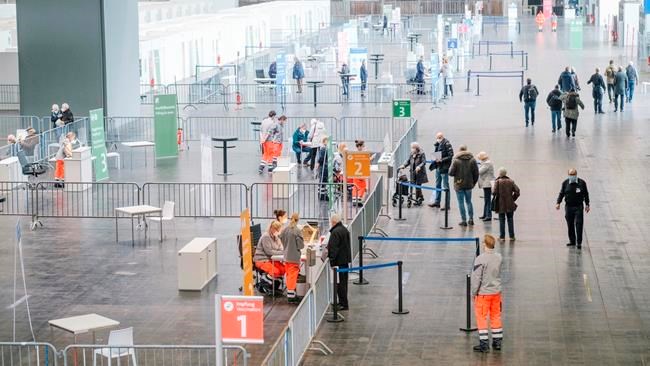WASHINGTON — People in the United States and parts of Europe believe the COVID-19 pandemic has better equipped their countries to handle the next major health crisis, a new poll suggests.Â
The Pew Research Center poll out Wednesday finds optimism for the future among a majority of 4,000 respondents in the U.S., the United Kingdom, France and Germany.Â
Perhaps not surprisingly, the Pew survey also found a growing percentage of people in all four countries who said COVID-19 had changed their lives significantly.
In the U.S., 74 per cent reported "a great deal" or a "fair amount" of change, up from 67 per cent in June; 70 per cent of those surveyed in the U.K. said the same, up from 66 per cent six months earlier.Â
Still, though, the results reflect a strong sense that the next major health emergency will be better handled than the current one.Â
In Europe, that optimism was strongest among those who already believe their countries have done a good job in the fight against COVID-19.Â
In the U.S., however, confidence was high — 67 per cent — regardless of whether respondents said they were disappointed or satisfied by the government's handling of the pandemic.
"When looking toward the future, publics in each of the four countries share in the optimism that their nations are well-prepared should there be a future global public health crisis," Pew said in a release.
"Feelings of hope are especially strong among those who think their country is currently handling the coronavirus outbreak well, though the U.S. is an exception."Â
The poll, conducted by phone in November and December, carries a margin of error of between 3.7 and 4.2 percentage points, depending on the country surveyed.Â
The poll did not include any data specifically from Canada, a country that happened to take a big step this week towards equipping itself for the next viral outbreak.Â
The federal government said Tuesday it would be ramping up Canada's capacity to manufacture vaccines, with plans to make the Novavax shot the first of its kind to be made domestically.Â
The survey was conducted before President Joe Biden moved into the White House, where he has deployed a counter-pandemic strategy that by all accounts barely existed under his predecessor.Â
That strategy was on full display Wednesday during one of the now-frequent COVID-19 briefings from the newly reconstituted White House coronavirus task force — a rarity in the waning days of Donald Trump's administration.Â
"We in the United States … are back on the global scene," said Dr. Anthony Fauci, the head of the National Institute of Allergy and Infectious Diseases and Biden's special medical adviser.
"This is a global effort. And the more we get the virus controlled globally — and we will be part of that process, as part of the global community — the better off we will be."Â
The poll also asked respondents how they would feel if their respective governments were to make a safe and effective COVID-19 vaccine mandatory. Â
Only in the U.K. did a majority of those surveyed, 62 per cent, said they would find such a policy acceptable. In France, 75 per cent of respondents said they would be opposed to a mandatory vaccine policy.Â
In the U.S., 57 per cent said they opposed the idea, but a much larger gap emerged when the results were divided along partisan lines. Â
Only 28 per cent of those who identified as conservatives said they would support requiring vaccination, compared to 60 per cent of U.S. liberals.Â
Before anyone contemplates a mandatory COVID-19 vaccine, the U.S. must first deal with two more pressing challenges, said Dr. Rochelle Walensky, the director of the U.S. Centers for Disease Control.Â
The first is the preponderance of people around the world who either don't believe in vaccination in general or have misgivings about the COVID-19 shot in particular. Â
"It's important to recognize that we have vaccine hesitancy here — we have to address that vaccine hesitancy at its roots and understand why people are hesitant," she said.Â
The second is supply: around the world, countries including the U.S. currently have far more demand for the vaccine than they are able to meet.Â
"We can't be in a place where we're thinking about making requirements for vaccination until we certainly have enough for the entire country to make sure that that's possible," Walensky said.Â
"Right now, it's premature to think about those requirements."Â
Only in Germany did fewer than half of those surveyed by Pew say the virus had changed their lives significantly. But even there, 47 per cent described significant change, up from 39 per cent in June.Â
In all four countries, a higher percentage of women described a significant impact from COVID-19, including 79 per cent in the U.S., compared with 68 per cent of men.
That gap was narrowest in France — 69 per cent of women reported dramatic life changes, compared to 63 per cent of men.Â
"In three of four countries, women are significantly more likely than men to report their life having changed due to COVID-19," Pew said.Â
"This divide reflects studies that have shown that women have lost jobs at a rate disproportionate to men."
This report by The Canadian Press was first published Feb. 3, 2021.
James McCarten, The Canadian Press




